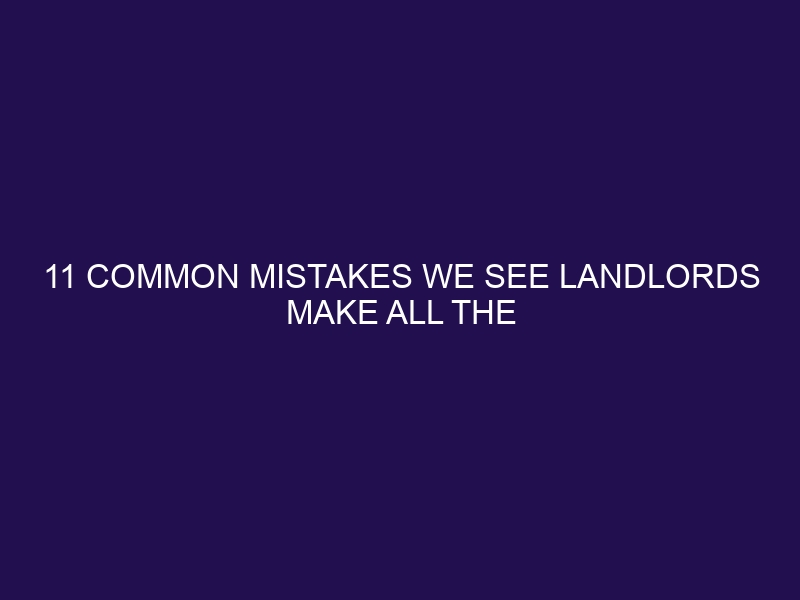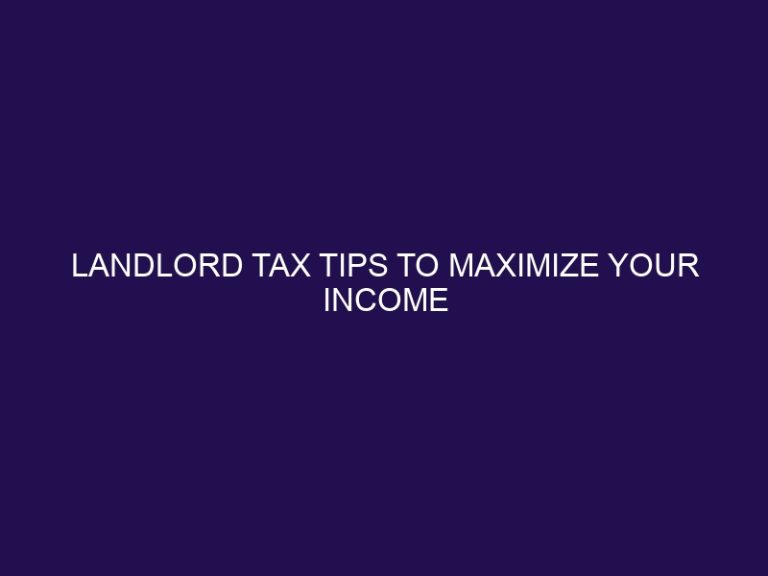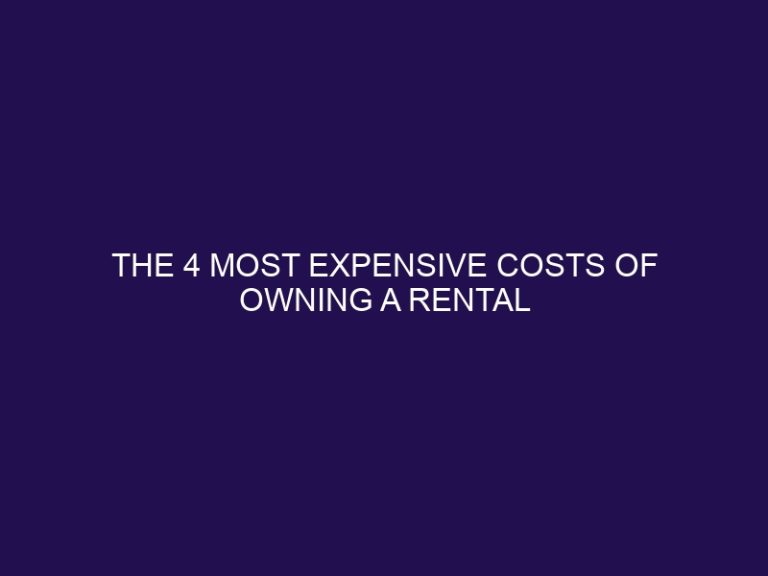11 Common Mistakes We See Landlords Make All the Time
Being a landlord can be a lucrative and rewarding experience, but it also comes with its fair share of challenges. One of the biggest mistakes landlords make is not being aware of common pitfalls that can lead to issues with their tenants or property. In this article, we will explore 11 common mistakes landlords make and the potential consequences of these mistakes.
- Not Screening Tenants Properly: Tenant screening is a crucial step in the rental process, but many landlords skip this step due to time constraints or other reasons. However, not thoroughly screening tenants can lead to problematic tenants and potential financial losses. It is important to conduct background checks, credit checks, and reference checks to ensure that you are renting to responsible and reliable tenants.
- Not Having a Written Lease Agreement: A written lease agreement is essential for outlining the terms and conditions of the rental agreement. Without one, you may face disputes with your tenants over expectations and responsibilities. It is important to have a written lease agreement that clearly outlines rent amounts, due dates, maintenance responsibilities, and other important details.
- Not Maintaining the Property: Regular maintenance of your rental property is crucial for the safety and satisfaction of your tenants. Neglecting maintenance can lead to safety hazards, damage to the property, and unhappy tenants. It is important to address maintenance issues promptly and conduct regular inspections to ensure the property is in good condition.
- Not Knowing Landlord-Tenant Laws: As a landlord, it is important to be familiar with the laws and regulations that govern the landlord-tenant relationship. Ignorance of these laws can lead to legal issues and penalties. Some key laws to be aware of include fair housing laws, eviction laws, and tenant privacy laws.
- Not Communicating Effectively with Tenants: Effective communication is key to maintaining a good relationship with your tenants. Not responding to their concerns or addressing issues in a timely manner can lead to frustrated and dissatisfied tenants. It is important to have open lines of communication and be responsive to your tenants’ needs.
- Not Handling Tenant Complaints Properly: When tenants have complaints, it is important to address them promptly and effectively. Ignoring or dismissing complaints can lead to conflicts and strain the landlord-tenant relationship. It is important to actively listen to your tenants and work towards finding a resolution.
- Not Enforcing Rules and Regulations: Establishing rules and regulations for your rental property is important for maintaining order and protecting your property. However, not enforcing these rules can lead to problematic tenants and a lack of respect for your property. It is important to consistently enforce rules and address any violations promptly.
- Not Having Adequate Insurance Coverage: Landlords should have insurance coverage to protect their property and finances in case of any unexpected events. Without proper insurance, landlords may face significant financial losses in the event of property damage or liability claims.
- Not Collecting Rent on Time: Timely rent collection is crucial for maintaining cash flow and ensuring the financial stability of a rental property. Rent should be collected on the agreed upon date and consistent late payments should be addressed promptly.
- Not Planning for Vacancies: Vacancies can happen unexpectedly and it is important for landlords to have a plan in place for when they occur. Not planning for vacancies can lead to financial strain and difficulties finding new tenants. It is important to have a contingency plan in place to minimize the impact of vacancies.
- Not Keeping Accurate Records: Landlords should keep accurate records of all transactions, communications, and maintenance requests related to their rental property. Not keeping records can lead to disputes with tenants and difficulties in keeping track of important information.
In conclusion, being a landlord requires attention to detail and knowledge of landlord-tenant laws. By avoiding these common mistakes, landlords can maintain a positive relationship with their tenants and ensure the success of their rental property.
Key Takeaways:
Not Screening Tenants Properly
- Thorough Application: Review potential tenants’ rental history, income, and references to ensure proper screening.
- Credit & Background Check: Assess credit score, criminal background, and eviction history to avoid not screening tenants properly.
- Interview: Meet with applicants to gauge their suitability as tenants and properly screen them.
- Verify Information: Confirm the accuracy of provided details to ensure proper screening of tenants.
Why is Tenant Screening Important?
Tenant screening is an essential process for protecting your property and securing dependable tenants. It allows landlords to evaluate potential risks, verify rental history, and identify trustworthy individuals. By understanding the importance of tenant screening, landlords can reduce the likelihood of property damage, late payments, and eviction complications.
What are the Consequences of Not Screening Tenants?
Not properly screening potential tenants can have serious consequences, including property damage, late payments, and legal disputes. It can also lead to disruptive tenants causing problems within the community, causing discord among neighbors. It is crucial to understand the potential consequences of not screening tenants in order to maintain a peaceful and financially successful rental property.
Not Having a Written Lease Agreement
Landlords often underestimate the significance of not having a written lease agreement, resulting in potential misunderstandings. A written lease agreement offers clarity on rental terms, responsibilities, and legal protection for both parties involved. It is crucial to explicitly outline all details, such as the rent amount, due dates, and maintenance obligations.
What Should Be Included in a Lease Agreement?
A lease agreement should contain all necessary information, such as the rent amount, due date, duration, pet policies, security deposit terms, maintenance responsibilities, and eviction conditions. It should also clearly state rules regarding subletting, noise, and property alterations in order to protect the rights of both landlords and tenants.
What are the Risks of Not Having a Written Lease Agreement?
Not having a written lease agreement can result in disputes over terms, difficulties in enforcing agreed-upon rules, and obstacles in legal proceedings. It also exposes both the landlord and tenant to potential misunderstandings and lack of clarity regarding their responsibilities and rights.
Pro-tip: It is always advisable to seek legal advice when drafting a comprehensive lease agreement to avoid these risks.
Not Maintaining the Property
Neglecting property maintenance can result in tenant dissatisfaction, expensive repairs, and potential legal problems. It is important to regularly inspect the property, promptly address any repairs, and proactively maintain it. Failure to properly maintain the property can also lead to a decrease in its value and make it challenging to find new tenants. Therefore, implementing a proactive maintenance schedule is crucial.
Why is Property Maintenance Important?
Property maintenance is crucial for upholding property value, tenant satisfaction, and safety. Neglecting maintenance can result in costly repairs, tenant dissatisfaction, and a decrease in property value. Regular maintenance helps to preserve the property’s appeal and reduces the risk of potential hazards.
What are the Consequences of Not Maintaining the Property?
Failing to properly maintain the property can have serious consequences. These include depreciation, tenant dissatisfaction, and potential legal issues. Neglecting maintenance can also result in property damage, decreased tenant retention, and violations of housing codes. Ultimately, this can lead to a decrease in property value and concerns for the safety of tenants. It is important to regularly maintain the property to avoid these negative outcomes.
Not Knowing Landlord-Tenant Laws
Not being aware of landlord-tenant laws can result in potential legal problems, such as unjust evictions or violating the rights of tenants. It is important to stay knowledgeable about local laws and regulations in order to avoid costly errors. A helpful tip is to consider becoming a member of a landlord association or seeking legal counsel to stay informed on rental laws.
What are the Key Landlord-Tenant Laws to Know?
What are the Key Landlord-Tenant Laws to Know?
These laws include:
- Rent control regulations
- Tenant eviction rights
- Fair housing laws
- Security deposit laws
It is important to familiarize yourself with:
- Lease termination notices
- Property access rules
- Anti-discrimination statutes
Knowing and understanding the local and state-specific laws is crucial to maintaining legal compliance and resolving disputes.
What are the Consequences of Not Knowing Landlord-Tenant Laws?
Not being knowledgeable about landlord-tenant laws can have serious consequences, including legal disputes, financial penalties, and property damage. It can also lead to delays in evictions, violations of tenants’ rights, and unexpected legal expenses. Therefore, it is essential to familiarize oneself with these laws in order to maintain a harmonious relationship between landlords and tenants.
Not Communicating Effectively with Tenants
- Regular Updates: Ensure regular updates are scheduled to keep tenants informed about property matters, maintenance, and regulations.
- Clear Policies: Establish and effectively communicate clear guidelines regarding rent payments, property use, and maintenance responsibilities.
- Feedback Mechanism: Actively encourage tenant feedback and promptly address any concerns that may arise.
- Emergency Communication: Provide clear and easily accessible emergency contact information and procedures for tenants to follow.
Why is Effective Communication Important?
Effective communication is crucial in fostering positive relationships between landlords and tenants. It helps to reduce misunderstandings and ensures prompt resolution of any issues that may arise. Furthermore, effective communication builds trust and encourages compliance with lease agreements. By communicating clearly and promptly, landlords can create a harmonious and professional rental environment.
What are the Consequences of Not Communicating Effectively with Tenants?
Poor communication with tenants can have serious consequences, including misunderstandings, disputes, and mistrust, which can greatly impact the landlord-tenant relationship. These issues can lead to delays in resolving problems, neglectful property damage, and even legal conflicts, resulting in financial losses and harm to the property’s reputation. To prevent these negative outcomes, it is crucial to maintain clear, timely, and respectful communication with tenants.
Not Handling Tenant Complaints Properly
Addressing tenant complaints promptly, actively listening, and finding mutually beneficial solutions are crucial for properly handling tenant complaints.
What is the Best Way to Handle Tenant Complaints?
Effectively managing tenant complaints involves actively listening to their concerns, promptly responding to their issues, and finding fair resolutions. It is crucial to address these issues with respect and transparency in order to maintain a positive relationship between landlord and tenant.
For example, a landlord who promptly addresses a leak issue reported by a tenant and arranges for repairs within 24 hours, will earn the trust and loyalty of their tenant.
What are the Consequences of Not Handling Tenant Complaints Properly?
Not properly addressing tenant complaints can have serious consequences, including increased dissatisfaction among tenants, potential legal disputes, and damage to the landlord’s reputation. This may also lead to tenant turnover, resulting in higher vacancy rates and financial losses.
Not Enforcing Rules and Regulations
Landlords often underestimate the significance of not enforcing rules and regulations. This carelessness can result in conflicts with tenants, damage to the property, and potential legal problems. Maintaining consistent standards ensures a harmonious and lawful tenancy.
Why is Enforcing Rules and Regulations Important?
Why is Enforcing Rules and Regulations Important?
Enforcing rules and regulations is crucial for preserving a harmonious rental environment, promoting tenant compliance with property guidelines, and protecting the condition and value of the property. Pro-tip: Clearly outline rules in the lease agreement and consistently enforce them to foster a respectful and well-maintained rental community.
What are the Consequences of Not Enforcing Rules and Regulations?
Not enforcing rules and regulations can have serious consequences, such as tenant disputes, property damage, and legal issues. It can also lead to a lack of order and safety concerns, as well as the devaluation of the property. Furthermore, non-compliance can strain landlord-tenant relationships and potentially result in financial losses.
Not Having Adequate Insurance Coverage
Landlords often underestimate the significance of lacking sufficient insurance coverage. Neglecting to obtain comprehensive coverage can result in financial risks in the event of property damage, liability claims, or loss of rental income due to unforeseen circumstances. It is essential to prioritize obtaining suitable insurance policies.
What Types of Insurance Should Landlords Have?
Landlords should have liability insurance, property insurance, and loss of rent insurance to protect themselves financially against property damage, legal claims, and loss of rental income. It is crucial to consult with insurance experts to ensure comprehensive coverage for potential risks.
What are the Risks of Not
Not properly screening tenants can lead to problematic tenants, loss of rental income, and damage to your property.
Not having a written lease agreement puts you at risk for misunderstandings and potential legal disputes.
Neglecting property maintenance can result in tenant dissatisfaction and a decrease in property value.
Remember to always conduct thorough tenant screenings to minimize potential risks.
Frequently Asked Questions
What are some common mistakes new landlords make?
Some common mistakes new landlords make include violating fair housing laws, under-marketing their rental property, using poor lease agreements, not properly screening tenants, and underestimating costs.
How can violating fair housing laws affect my rental property?
Violating fair housing laws can result in legal issues and financial losses for landlords. It is important to follow these laws in the tenant selection process and in how the property is marketed.
Why is it important to properly screen tenants?
Properly screening tenants can save time and money in the long run. It can help landlords avoid renting to the wrong tenant, such as chronic late payers or those with a history of causing property damage.
What are some tips for marketing my rental property?
To avoid under-marketing your rental property, it is important to list it on multiple rental sites, provide accurate and appealing descriptions, and use professional images. Utilizing 3D tours can also minimize the need for multiple showings.
How can using poor lease agreements affect me as a landlord?
Using poor lease agreements can lead to legal issues and financial losses for landlords. It is important to use a well-written and legally sound lease agreement to protect your investment.
What are some common mistakes landlords make when it comes to finances?
Some common mistakes landlords make with finances include not setting up the business properly, not keeping separate bank accounts, and underestimating costs. It is important to treat being a landlord as a business and properly manage finances.







